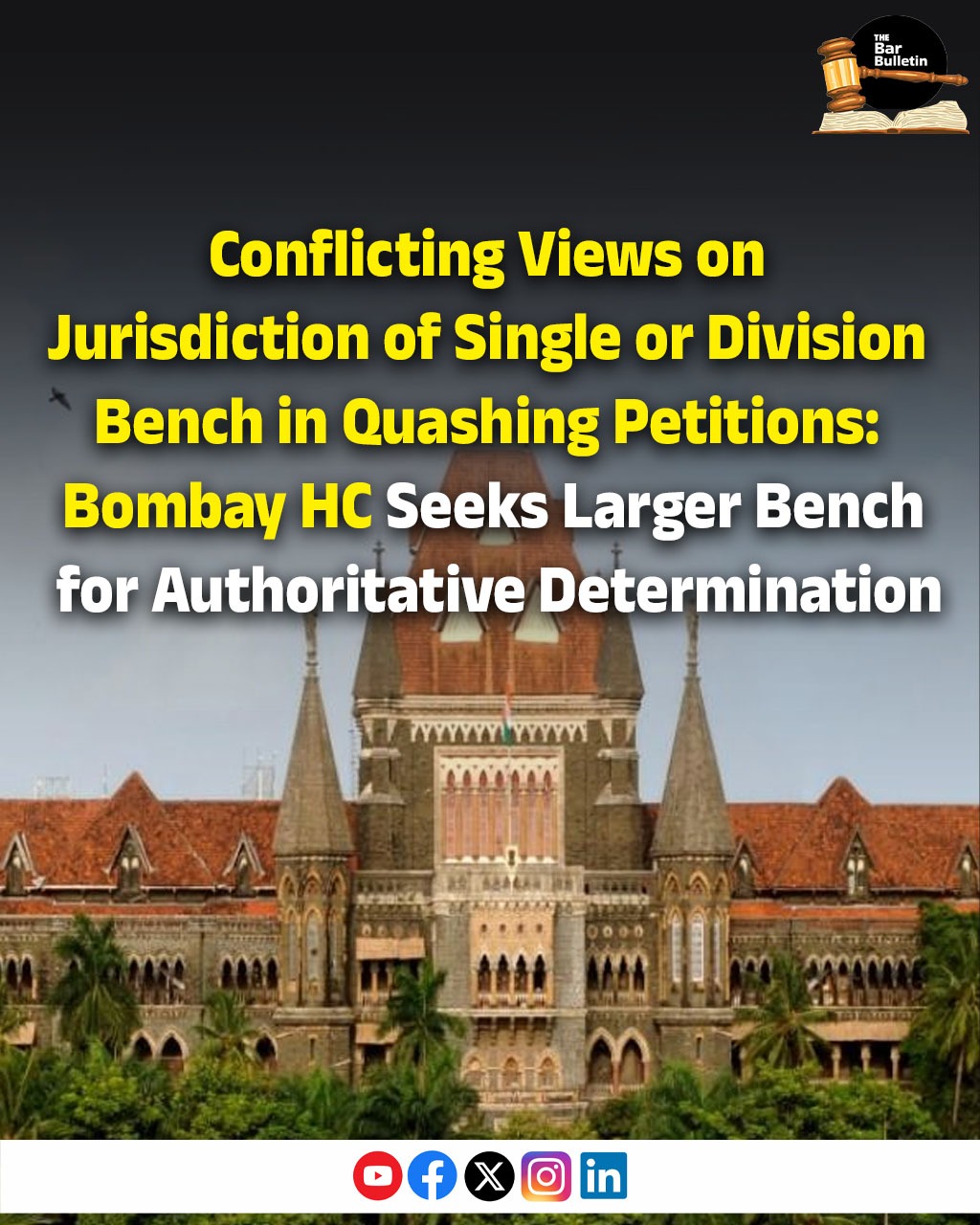The Bombay High Court, Aurangabad Bench, addressed a significant procedural issue concerning the jurisdiction of Single and Division Benches in hearing petitions seeking quashing of FIRs, charge-sheets, and cognizance orders under Section 482 of the Code of Criminal Procedure, 1973[1].
The applicants had approached the Court to quash FIR, Charge-sheet, and Sessions Case pending before the Additional Sessions Judge, Newasa, Ahmednagar, in connection with offences under Sections 307, 120-B, 201, 341, 504 and 506 of the IPC[2], as well as provisions of the Arms Act, 1959 and the Bombay Police Act, 1951.
During the pendency of the application, the trial court took cognizance of the case, prompting the applicants to seek an amendment to challenge the trial court’s order of cognizance as well, in view of the recent Supreme Court decision in Pradnya Pranjal Kulkarni v. State of Maharashtra, SLP (Cri.) No.13424 of 2025.
The central issue before the Court was whether a composite prayers, seeking to quash the FIR, charge-sheet, and order of cognizance, should be heard by a Single Judge or a Division Bench, in light of the Bombay High Court Appellate Side Rules, 1960 (“Appellate Rules”).
The applicants contended that as per the Appellate Rules, matters involving the quashing of an FIR or charge-sheet, irrespective of whether they are filed under Section 482 CrPC or read with Articles 226 and 227 of the Constitution, must be placed before a Division Bench. It was further submitted that while a challenge to the order of cognizance under Section 190 CrPC[3] might be maintainable before a Single Judge, the inclusion of a prayer to quash the FIR or charge-sheet would attract Division Bench jurisdiction.
The Bench of Justice Vibha Kankanwadi and Justice Hiten S. Venegavkar observed that the existence of conflicting views between coordinate benches of the Bombay High Court at its Principal Seat on this jurisdictional issue required authoritative resolution to ensure procedural uniformity across benches.
Accordingly, the Court directed the Registry to place the matter before the Hon’ble Chief Justice for constituting a larger bench to decide the following questions of law:
(1) Whether under Chapter I Rule 2(h)(ii) and Chapter XVII Rule 18(4) of the Appellate Rules, petitions to quash an FIR, or charge-sheet must be heard by a Division Bench regardless of whether they are filed under Section 482 CrPC or Articles 226/227, or can a Single Judge finally dispose such petitions?
(2) Whether a composite petition challenging FIR, charge-sheet, and the order taking cognizance of the matter can be entertained by a Single Judge, or does the Division Bench retains its jurisdiction to decide all reliefs so as to avoid multiplicity; and
(3) Whether setting aside an order of cognizance under Section 190 CrPC, or an order issuing process under Section 204 of CrPC[4] would result in quashing the FIR or charge-sheet, and if no, whether a Single Judge can grant complete relief in such composite cases as per the appellate rules.
Appearances
Applicants- Mr. A. D. Ostwal a/w Mr. S. S. Munot, Mr. K. S. Ostwal, Advocate.
Respondents- Mr. V. L. Bhange h/f Mr. K. D. Jadhav, Advocate for respondent No. 2 and Mr. V. K. Kotecha, APP for respondent-State
To assist the Court- Mr. R. N. Dhorde, Senior Advocate, Mr. R. S. Deshmukh, Senior Advocate, Mr. V. D. Sapkal, Senior Advocate, Mr. P. R. Katneshwarkar, Senior Advocate, Ms. R. S. Kulkarni, Advocate, and Mr. G. R. Syed, Advocate.
[1] Replaced by Section 528 of the Bhartiya Nagarik Suraksha Sanhita, 2023.
[2] Replaced by Sections 108, 61(2), 238, 126(2), and 352 of the Bhartiya Nyaya Sanhita, 2023.
[3] Replaced by Section 210 of the Bhartiya Nagarik Suraksha Sanhita, 2023.
[4] Replaced by Section 227 of the Bhartiya Nagarik Suraksha Sanhita, 2023.



